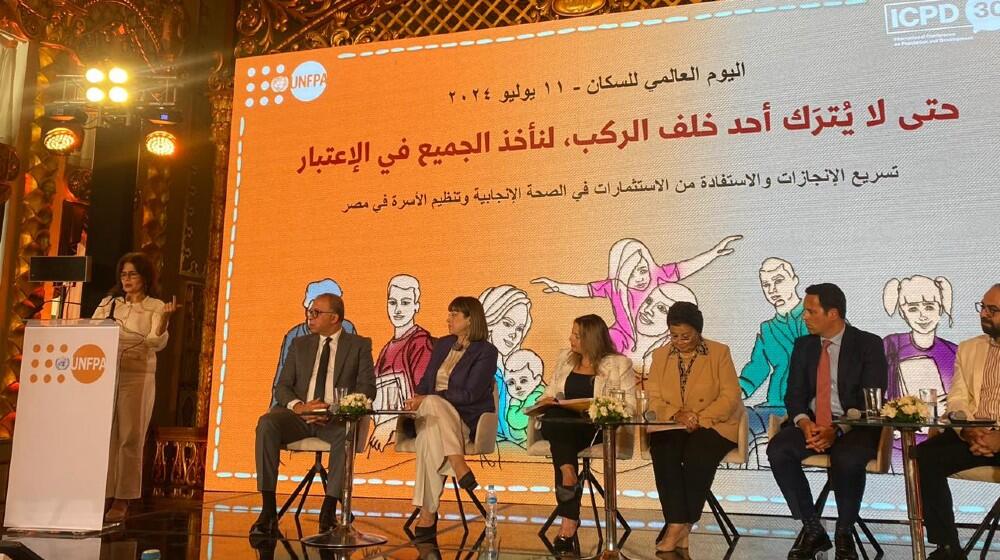On the occasion of World Population Day, UNFPA Egypt organized a panel discussion on “Accelerating Achievements and Leveraging Investments in Reproductive Health and Family Planning” based on the findings Investment Case towards Ending Unmet Need for Family Planning in Egypt, recently launched by the Institute of National Planning and UNFPA.
The discussions explored the interrelationship between health, particularly reproductive health, social protection resilience and financing and funding gaps to overcome existing inequalities.
The panel discussion was moderated by Ms. Germaine Haddad, UNFPA Representative in Egypt a.i., with the participation of Dr. Ashraf El-Arabi, President of the Institute of National Planning, Dr. Abla Al-Alfi, Deputy Minister of Health and Population for Population Affairs and Family Development, Ms. Elena Panova, UN Resident Coordinator in Egypt, Mr. Alex Segura, Senior Resident Representative of the International Monetary Fund (IMF) in Egypt, and Dr. Ahmed Seyam, Deputy Chief Executive Officer of the Health Insurance Authority.
Dr. El-Arabi presented the findings of the Investment Case towards Ending Unmet Need for Family Planning in Egypt, which illustrated three scenarios and indicated the additional investments needed to reduce unmet need for family planning in Egypt, and avert unintended pregnancies, and unsafe abortions, along with the corresponding benefits over a defined period.
The investment case, he said, quantifies the benefits of family planning and offers analysis that is invaluable for policymakers to make informed decisions about prioritizing interventions and allocating resources.
A total investment of EGP 11.1 billion is needed in family planning to reduce unmet need for family planning in Egypt to 8.6 percent by 2030, and avert 1.4 million unintended pregnancies, according to the investment case.
According to the Egyptian Family Health Survey 2021, the unmet need for family planning currently stands at 13.8 percent.
The participants agreed that prioritizing family planning is a strategic investment for Egypt's future and will contribute to improving health, will avert unintended pregnancies and unsafe abortions and will contribute to empowering women as well as economic growth.
Mr. Segura said he was impressed by the “specificity of the investment case and its compelling argument,” adding that it is this type of specific calculations that are extremely helpful for the IMF to approach governments and help them find the right resources if they are convinced and decided that this is the right approach.
According to Mr. Segura, the required additional cost indicated in the investment case is “small in relative terms.”
“When you look at the three scenarios [in the investment case],” he said, “even the highest scenario is 0.1 percent of the country’s GDP.”
“The IMF wants countries to achieve higher and more inclusive growth,” he said, “and there is no better policy to ensure higher and inclusive growth than investing in women.”
Reproductive health and family planning require multi-sectoral collaborations in order to close the funding gap, including the engagement of the private sector, Dr. Al-Alfi said, highlighting the value of integrating a comprehensive family planning package with other health services.
She underlined that investing in long term family planning methods, and the capacity building of service providers are among some of the priorities for Egypt, along with the need to locally produce family planning methods.
On her part, Ms. Panova said that this type of evidence presented in the investment case has proven to be a great advocacy tool for the UN for leveraging finance towards achieving the Sustainable Development Goals (SDGs).
“It provides evidence that social investments are not only for social good, but they are a catalyst for economic growth,” she said.
She explained that investment cases closely developed with national counterparts are a testament to national ownership and present a greater chance to make a difference on the ground.
Leveraging Egypt’s Universal Health Insurance program to sustain long-term financial protection and ensure access to reproductive health services, was also highlighted by Dr. Seyam.
This year World Population Day highlights the importance of collecting inclusive data towards a resilient and equitable future for all.
During the panel discussion, participants agreed that data helps reach populations in vulnerable situations and addresses disparities in access. Dr. El-Arabi explained that robust monitoring and evaluation systems are also essential to track the return on investment in family planning programs, ensure accountability and allow for course correction. He added that data, and linking databases in Egypt enhance credibility and reassures international financial institutions and enables them to track progress.



